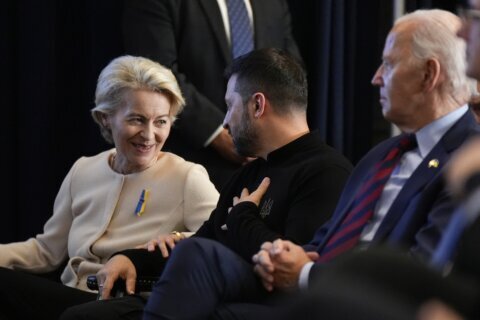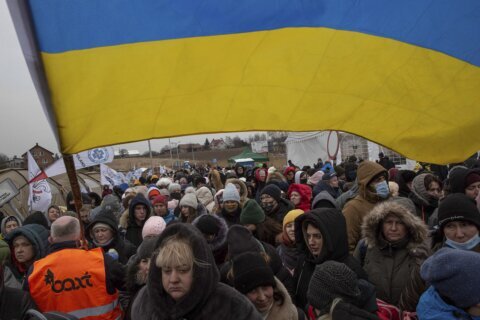BUDAPEST, Hungary (AP) — Hungary always has and always will defend itself against foreign attacks, Prime Minister Viktor Orbán said on Friday after one of his closest aides provoked controversy by suggesting that Hungary wouldn’t have fought against a Russian invasion as Ukraine has done.
Speaking to state radio, Orbán sought to downplay the remarks by his political director, Balázs Orbán, which stirred outrage among many in Hungary and led to calls for his resignation.
Speaking on a podcast on Wednesday, Balázs Orbán, who is not related to the prime minister, said that Ukrainian President Volodymyr Zelenskyy had made an “irresponsible” decision by opting to militarily defend his country after Moscow launched its full-scale invasion in February 2022. Hungary, he said, has learned that “precious Hungarian lives” must be treated with caution rather than “offering them up” for defense.
Prime Minister Orbán called the comment “an ambiguous statement, which in this context is a mistake.”
He emphasized that Hungary has “always defended itself, it will defend itself today and will continue to defend itself in the future by all possible means.”
Since Russia’s invasion of Ukraine in February 2022, Hungary, a NATO member, has taken an adversarial position toward its neighbor, and sought to block, delay or water down European Union efforts to provide financial and military support to Kyiv and to pass sanctions on Moscow over its war.
Such efforts have led to accusations from many European leaders that Hungary is acting to divide the EU and advance Russian interests.
Balázs Orbán’s statements angered many in Hungary who saw them as a suggestion that Hungarian fighters in an anti-Soviet uprising in 1956 had made a mistake by resisting Soviet occupation.
The uprising was eventually crushed by the Red Army, killing as many as 3,000 civilians and destroying much of the capital Budapest.
“Every country has the right to decide its own destiny for itself,” Balázs Orbán said. “But based on ’56, we wouldn’t have done what President Zelenskyy did two and a half years ago, because that was irresponsible.”
Hungary’s Cold War-era uprising looms large in the country’s consciousness as a symbol of its heroic struggle for independence and self determination. Some Hungarians view their government’s close ties to Russia today as a betrayal of the 1956 revolution’s efforts to force Soviet soldiers out of the country.
In response to the criticism, Balázs Orbán said in a post on social media Thursday that Hungary’s government sees “no point” to the war in Ukraine, and that “hundreds of thousands of people have died … for nothing.”
But on Friday, Prime Minister Orbán sought to diffuse the tensions by saying Hungary owes a debt of gratitude to the ”heroes” and “freedom fighters” who took up arms against Soviet oppression in 1956.
“If a person talks about such delicate issues, then it must be formulated very precisely, leaving no doubt about our position,” he said.
On Thursday, Hungary’s most prominent opposition figure, Péter Magyar, called for Balázs Orbán’s resignation by Oct. 23, the 68th anniversary of the revolution.
“Such a man cannot hold public office alongside the Hungarian Prime Minister,” Magyar wrote.
Copyright © 2024 The Associated Press. All rights reserved. This material may not be published, broadcast, written or redistributed.







